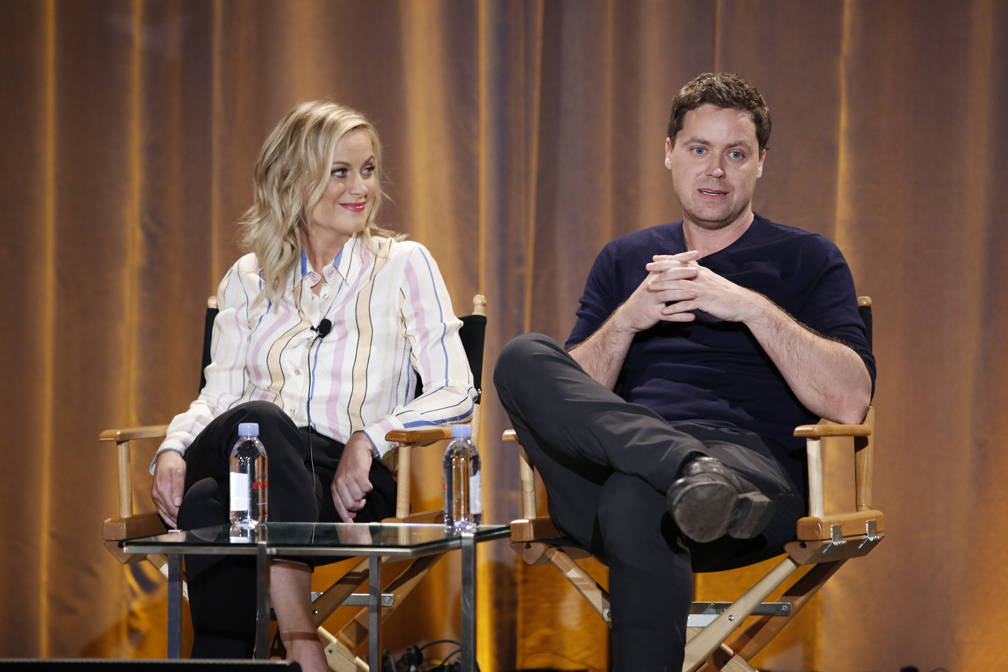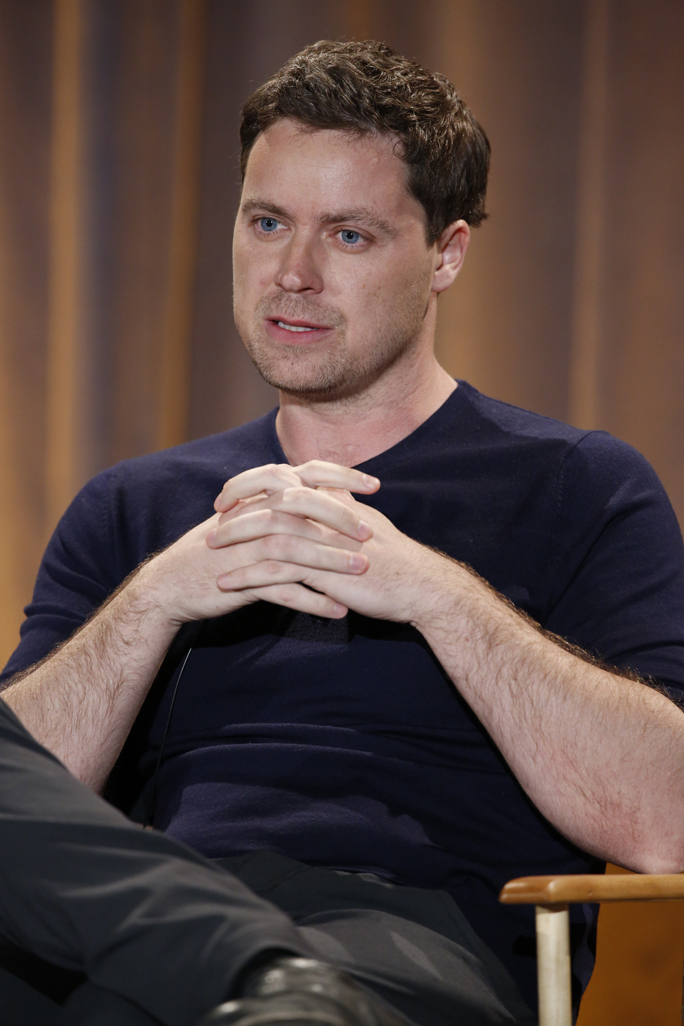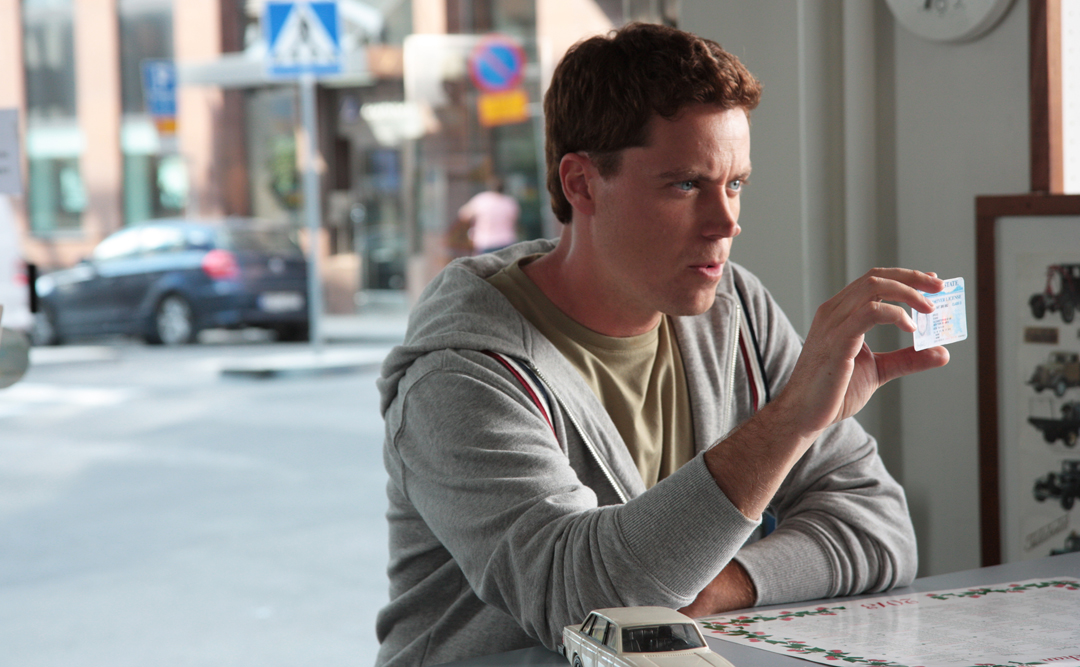'Ambassador of two home countries'
Greg Poehler on creating the new sitcom 'Welcome to Sweden' and living the rule in real life.
-
 Amy Poehler, Greg Poehler at NBCUniversal's summer press day for "Welcome to Sweden" Season 1. Photo: Ben Cohen/NBC)
Amy Poehler, Greg Poehler at NBCUniversal's summer press day for "Welcome to Sweden" Season 1. Photo: Ben Cohen/NBC) -
-
Greg Poehler, younger brother of comedienne Amy Poehler, stars in the new sitcom Welcome to Sweden (Read Ulf Kirchdorfer's review of the first episode here: Review: Welcome to Sweden. To be funny or not .., a classic fish out of water tale with a Nordic twist on NBC Thursdays at 9/8C. Interview by Mary Lee
-
 Swedish comedy export "Welcome to Sweden" returns to NBC in July. Greg Poehler during NBCUniversal’s summer press day, April 2014. Photo: Ben Cohen/NBC.
Swedish comedy export "Welcome to Sweden" returns to NBC in July. Greg Poehler during NBCUniversal’s summer press day, April 2014. Photo: Ben Cohen/NBC. -
-
Nordstjernan: First things first, you have to pass the Swedish test by pronouncing “seven sick sailors” in Swedish.
-
 Greg Poehler as Bruce Evans newly arrived in Stockholm, "Welcome to Sweden" Season 1. Photo: Benjamin Thuresson/NBC)
Greg Poehler as Bruce Evans newly arrived in Stockholm, "Welcome to Sweden" Season 1. Photo: Benjamin Thuresson/NBC) -
Greg: Sju sjuka sjömän (said perfectly).
-
Nordstjernan: That was great. You actually sounded Swedish. So, how did you spend Midsommar?
-
Greg: We went to my wife’s family house. It’s amazing, right in the middle of the archipelago. There are hundreds of people that come to their lawn, and we have all these games: tug of war, potato sack races, egg tosses and “Små grodorna” for everyone! There are lots of frogs jumping and very fond memories. When I hear “Små grodorna,” it’s Midsommar and that means I am very drunk.
-
Nordstjernan: You have the second highest rated show on TV4, first among the younger demographic. It's the highest in viewer satisfaction and already picked up for a second season in Sweden. And now, the U.S. premiere is a few days away. How are you feeling?
-
Greg: The Swedish experience in general of having a show come out, and have people critique it and comment on it and have people watch it and comment on it, and wait for ratings is kind of exhausting. I just completed that cycle and now it’s starting all over again. I’d prefer a little bit of a break (laughs). We always kind of made it as a show for Sweden and for the Swedish audience, and we knew there was a potential that American channels would be interested, so we always had that in mind when we were making the show. Any kind of success or failure in the U.S. for me is kind of secondary. It’s kind of like gravy if it goes well. That’s the way I’m looking at it. I’m trying to take all the pressure off the U.S. ratings.
-
Nordstjernan: Are you ready for the ride if it goes well?
-
Greg: Probably not. I don’t know what that would entail. The Swedish ride has been crazy but I don’t know what the American ride looks like (laughs). It’s a bit different for me in that I now have paid agents in the U.S. and I am now starting to explore other opportunities there, but I live in Sweden and I plan on living here. I was in Hollywood last month meeting with people for various movie and TV roles and everyone’s like, “So how much longer are you living in Sweden?” And I’m like, “I live there for good, like permanently.” And they say, “Yeah, but how long until you move here?” I think it is difficult for people to wrap their brains around it. If I do end up working in Hollywood, I think I am going to be a new breed of star that’s living in Europe and coming in for 10 weeks a year. But I don’t know how it’s gonna go. As far as the American reception, I think it’s going to be either a sneaky hit or people are going to hate it because of the subtitles.
-
Nordstjernan: I was happy to see the subtitles and that you didn’t dub the Swedish speaking scenes. Is this the first time subtitles have been used widely in an American TV show? Are you breaking new ground here?
-
Greg: Yeah, I think so. Certain shows have had a subtitle here or there but this is going to be the first network American show that has subtitles as an element in every episode. I’m very proud and happy that NBC decided to take a chance on that. That was obviously a big thing for them. I know it was. When we originally were thinking of going with them, they were very concerned with how much of the show was going to be subtitled. It’s going to be an interesting experiment. It can go one of two ways. I think people will think either it’s interesting and exotic and cool or they will immediately turn the channel. I don’t think there is any middle ground there.
Nordstjernan: There is a huge cultural difference in the way Swedes are more accepting of nudity and less hung up on language, particularly certain expletives. How do you deal with sculpting the show for a viewer in Kansas without losing its edge? -
Greg: Thankfully, there’s not much of a difference between the two, other than some minor language stuff and some male nudity. I actually thought we would have to do more censoring. There are a couple jokes that we lost, especially from the first episode, that really are painful to me. We always had in mind when we were writing that we were also going for the American audience, so we tried to create a show that worked in both places. That was always a goal. It’s easier when you start from that standpoint and you’re not making a purely Swedish show and then trying to transform it into something that an American audience will enjoy. We were always starting from that assumption.
-
Nordstjernan: Most Americans really don't know too much about Sweden beyond IKEA, Vikings or stereotypes, like the Swedish chef, for example. You probably didn’t realize two years ago when you were writing the script that you could end up being one of the greatest Swedish ambassadors to the U.S. in history?
-
Greg: That’s funny! I actually got that question from some Americans here in Sweden where it was the opposite, where they said, “You realize that you are representing all of us Americans here in Sweden?” So I’m like the American ambassador to Sweden and the Swedish ambassador to the U.S. at this point. I think Sweden ends up looking really good on the show. We shot it during the summer when the weather was really great, so if anything people might get a false impression of Sweden as this picturesque sunny vacation hot spot. And I’ll get blamed by a bunch of Americans who move to Sweden and wonder who turned out the lights.
-
Nordstjernan: It might end up being like the Disney movie Frozen where fans are all traveling to Norway now. You might end up helping Swedish tourism!
-
Greg: I could. Why not? When I originally conceived of the show, I wrote in that first day that I wanted it to be a show that introduced Sweden to the U.S. in some respects and also portrayed Americans in a reasonably favorable light to Swedes. And we wanted to show Swedes how it is, not just for Americans, but for the immigrants living in their country. It was always kind of the plan to cover all those bases.
-
Nordstjernan: I know this is comedy but do you still feel a sense of responsibility too?
-
Greg: I didn’t want to hit people over the head with those messages but I did want there to be some element of what it’s like to be an immigrant in any country. It doesn’t necessarily have to be specific to Sweden. The life of an immigrant is often a lonely existence and it’s hard to adapt and learn the local cultures and find a job and fit in and find friends. All that stuff is common to anyone who has moved anywhere or found themselves in a strange or uncomfortable situation. We didn’t want to gloss over that. We wanted to show that as much as we could while also obviously trying to make it funny.
-
Nordstjernan: Do you view yourself and the show as cheerleaders for Sweden?
-
Greg: When I am in the U.S., I am a big cheerleader for Sweden. When I am in Sweden, I’m a cheerleader for the U.S. (laughs). There is something about championing your cause in a strange land. I love living here. I am very proud to live here. I never wanted the show to be about making fun of Swedes or trying to point out like “look how ridiculous they are.” If anything, I wanted to point out what Sweden is like through my eyes and through the eyes of an American or someone who hasn’t lived here and just point out the differences. That can be funny in and of itself without having to go to stereotypical caricatures.
-
Nordstjernan: I think you succeeded. Obviously the ratings in Sweden should tell you that you did.
-
Greg: You can’t please everyone. But for the most part people have really responded well and I am so happy about that.
-
Nordstjernan: You don’t get anywhere following the crowd — successful people take risks. You have been open about battling your Swedish producer on the direction of the show. Can you touch on that a little?
-
Greg: Even though we got great ratings and most of the Swedish people I have met are really big fans of the show, for the most part the critics in Sweden didn’t like it. They don’t have sitcoms here, not American sitcoms with laugh tracks and things like that. It’s all this really gritty, ultra realistic, almost sad form of comedy that they have been used to for so long. My show is somewhere in between a sitcom and a traditional Swedish realistic comedy. The tone of it throws some people off here because they don’t have anything like it. The flip side is partly why it has really worked here as well because people found it to be refreshing and not as dark as some other comedies.
In some ways the show is very much like a sociological experiment. You have the same show and you show it to a bunch of different people and you get all these different reactions. I saw a review in the Washington Post that said the show is too subtle and too underplayed for them. I found that to be so funny because it was the exact opposite of any criticism we got in Sweden, which was “we were way over the top, over doing it, too sitcommy.”
I think that is inevitable when you try to make a show that appeals to multiple cultures. People are just going to see the same exact thing and view it differently. At the end of the day, I did the best I could and I made a show that I wanted to make. I am really proud of that and you can spend weeks, hours and months dissecting what other people think of it but at the end of the day you just have to let that all go and hope for the best. -
Nordstjernan: You wrote and filmed season one in Sweden before you were picked up by NBC. Are you writing the second season differently now? Are you consciously tailoring your scripts toward the American market?
-
Nordstjernan: That’s an interesting question. There will be a difference in terms of language, like the unnecessary swearing and cursing in Season 1 that didn’t further the plot at all (laughs). The ratings in the U.S. dictate our Season 2. That is why we haven’t started writing it yet. We start writing in August. If NBC wants a Season 2 then we are going to do the same thing we did with Season 1, which is to try to make a show that is for both audiences. If the show does poorly and they don’t sign on to Season 2, then it becomes a “Swedish only” show.
-
Nordstjernan: When you move to a new culture, you see new things and you think some are great and others drive you nuts. What are some things that you still prefer American and what things do you prefer Swedish?
-
Nordstjernan: The reason we are here is because we were both working in New York when we had our first kid. It was really difficult to spend so little time with him. That was the incentive for the move. As I am speaking to you right now, I have my daughter in my arms — that is level of the paternity I am taking here. The vacation time, too, I mean, c’mon? I feel like I am on vacation half of the year. There is a little more focus on leisure and family life when you have three kids.
Food delivery? It doesn’t even exist here, and after living in New York for 10 years, we were ordering out all the time, and then we came here and it’s like, “I have to make my own food? It’s like going back in time in many ways. A lot of people in the U.S. long for the 1950s. It was a simpler time and I feel like I am living in that time. And there are some advantages and definite disadvantages to that! -
Nordstjernan: I can’t believe this is your acting debut. I’m really impressed and think you are a natural. You have a natural charm, and your character is so likeable, I found myself rooting for him.
-
Greg: Thank you so much. Everything you said was written in the description of the character. When I created the show, the goal was to have two immensely likable characters in Bruce and Emma. For that reason, we consciously scaled back Bruce and Emma’s comedic traits. Obviously there is the temptation to give them really funny traits, especially when you are in the writer’s room. I just wanted to have them be the two normal characters in the midst of some other characters that maybe were a bit over the top and crazy. I think the show depends on that. You want people rooting for them. The show is really about their relationship and whether their love will survive this culture clash. In order to do that, we had to pull back a little on them.
I had never acted before, ever, in my life. Before we started filming, I had a lot of friends who asked, “Are you gonna take acting classes or go to seminars?” I was like, “It’s too late for that!” I just tried to play every scene how I would actually react in that situation. That was my starting point to try to make it as real as possible. -
Nordstjernan: Lena Olin is such a talented actress. And Patrick Duffy and Illeana Douglas are hilarious as your parents. Then you have the cameos by Will and Amy, and others. You are surrounded by such talented people.
-
Greg: Because of my inexperience, my other goal was to surround myself with the best actors possible, you know, to make yourself look better by osmosis. The Swedish cast was amazing. Everyone there is so talented. Almost all of them were acting in their second language, so when you take that into account, it’s so impressive. The American cameos? We were so grateful to have them and almost all of them came to Sweden. It such a huge “get” for us to have them show up here for a few days or a week. We tried to get people who had some sort of Swedish connection. Will Farrell’s wife is Swedish so he is here every summer. Gene Simmons was on tour with Kiss in Sweden for a couple days. Aubrey Plaza had a Swedish boyfriend in high school so she had been here before. And Patrick Duffy is still one of the most famous American actors in Sweden because Dallas was on this particular channel in the 1980s like 80 percent of the day.
-
Nordstjernan: Where did you film the summer house scenes?
-
Greg: A place called Värmdö. It’s pretty close to home, maybe a 30 minute drive. We were at that summer house for a couple weeks, by the water. It was great. And Björn Borg’s house was right next door. We’d see him across the water and he had a tennis court there and we saw him playing all the time.
-
Nordstjernan: I enjoyed the part with Björn Ulvaeus at the ABBA Museum.
-
Greg: It’s funny. He was wearing his ABBA costume. They had just opened a few weeks before when we were filming and there were people coming in who thought that this was part of the exhibition. He was standing outside greeting people as they came in. Those people got the ultimate ABBA experience.
-
-
